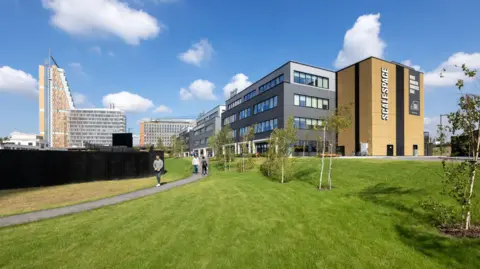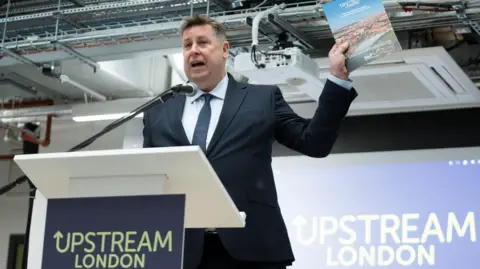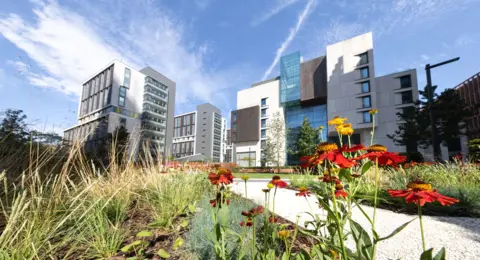Plan hatched in pub leads to area's £6bn overhaul
 Imperial College London
Imperial College LondonAn idea hatched in a pub has led to a £6bn transformation of an area in west London by turning it into a technology and life sciences quarter which has gone on to create 13,000 jobs, according to a new report.
Hammersmith Council leader Steve Cowan said the idea to rejuvenate White City came about when he was chatting with his fellow councillor, Professor Andrew Jones, about US models of co-operation between universities, business and government.
They then persuaded the then president of Imperial College London to come on board and build a new campus at the heart of the district.
"We're working hard to turn the borough into a global beacon of innovation and growth," said Mr Cowan.
The council adapted its planning policies to encourage research and development facilities and provide cheap and flexible laboratory space for start-ups and scale-ups attracted by the cluster effect around Imperial College London.
The model depends on academia, business and local government working closely together over a sustained period.
Local businesses and Imperial College have already built links with 20 primary and 10 secondary schools to strengthen ties with the local community, with that commitment being formalised with a guarantee called the Upstream Pathway Bond.
Businesses who sign up will agree to provide a "clear pathway" for local people into new skills and new jobs.
'Off the chart'
The inspiration for the project came from Kendall Square, the district which has grown up around the Massachusetts Institute of Technology, and Silicon Valley in the San Francisco Bay area.
Now, a progress report on the White City Innovation District has found investment has focused on creating jobs in the green and climate technology as well as the digital sectors.
Cosmetics giant L'Oreal has also opened its headquarters there.
 Upstream London
Upstream London"I have never seen such a spirit of partnership," says Professor Hugh Brady, Imperial College's president.
"We have this fantastic eco-system of start-ups and skills and a collective ambition that is off the chart."
 Imperial College London
Imperial College LondonSixfold, a biotech company founded by Alex Perdrix Rosell, says she chose the district over other science parks because of the access to flexible lab space and proximity to Imperial College's state-of-the-art facilities, as well as its location and airport connections.
"It is truly special to contribute to the economic growth of the neighbouring area in a socially impactful way, ensuring the local community benefits from the development and opportunities being created," she said.
'Crucial role'
The council hopes its approach will feed in to the government's focus on growth.
Mr Cowan said: "The key role local authorities can play in supporting economic growth through an entrepreneurial municipal government culture has been crystallised, in our thinking, through our experience of working on this agenda.
"At a time when decision making is becoming more devolved and the government is developing its national modern industrial strategy, we hope the crucial role of local authorities will be fully factored in at both a national and regional level."
Listen to the best of BBC Radio London on Sounds and follow BBC London on Facebook, X and Instagram. Send your story ideas to [email protected]
